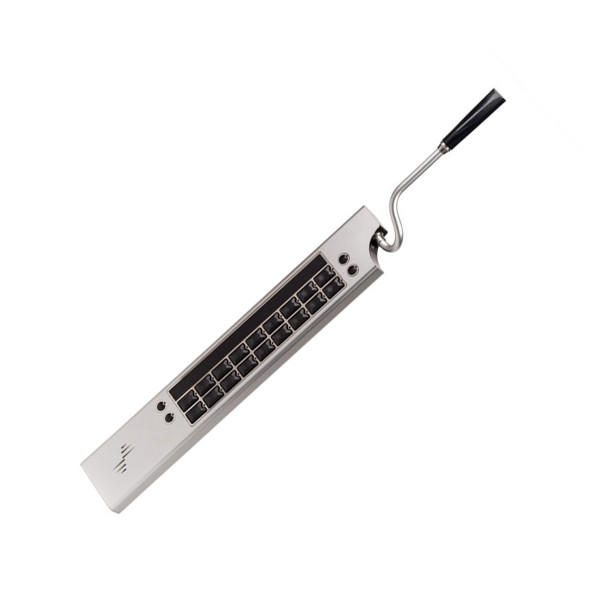Pricematch:
Contact us via online chat module to request pricematch
"The Eigenharp Pico is an unique electronic musical instrument with keys, ribbon and breath controllers.The ultra-versatile Pico is simple to use and anyone can play it. Light and portable, it packs a powerhouse of features. Use it to play solo, play and record loops, change scale and key, transpose, alter tempo, program beats, create arrangements, switch and layer multiple sounds, all while playing live. It's ideal as a solo instrument or for playing in a band.With 18 playing keys and 4 mode keys, a strip controller and breath pipe, the smaller Pico has the majority of the playing features of the Eigenharp Alpha. It plays an unlimited range of sounds and is available in three finishes. The Eigenharp Pico, with its ease of playing and transformational approach to learning scales and music theory, represents a new and easier way to learn to play a musical instrument. The Pico gives you freedom to express your creativity through improvisation like no other electronic instrument in existence."
System requirements
Mac OS X 10.4 or higher.
Intel processor with 2GHz or higher.
2GB RAM.
10GB free HD space.
USB 2.0 compatible USB port.
Pico supported on Windows7
Alpha and Tau not Windows compatible.
Additional recommendations
CoreAudio compatible audio hardware recommended.
At least 4GB of RAM for larger SoundFonts.
At least 15GB free disk space (for the downloadable additional free Soundfonts and Loops).
CoreMidi compatible MIDI hardware.
General Software Properties:
Polyphony - Maximum number of concurrent notes: at least 40.
Polyphony - Maximum number of simultaneously (within 5ms) starting notes: at least 8.
File formats: SF2 (Soundfont 2) and AIFF (Apple Loop).
Plugin formats: AU (Mac) and Eigenlabs native instruments.
Latency: less then 7ms end to end (from key press to sound).
Sample rates: 96khz, 48khz, 44.1khz.
MIDI in/out via USB MIDI Interfaces.
The Eigenlabs software is based on a modular synthesis model which allows control inputs to be routed and manipulated by an advanced user to achieve a wide variety of effects. Almost any control from the keyboard or MIDI inputs can be used to manipulate any parameter in the system. Many of these options are available to users today via the Eigenlabs Browser and the keys on the instruments. More advanced configuration is possible via the Eigenlabs Workbench. This is now in use with our beta test group and will be released to the wider community in early 2010.
Additional recommendations
General Software Properties:
The Eigenlabs software is based on a modular synthesis model which allows control inputs to be routed and manipulated by an advanced user to achieve a wide variety of effects. Almost any control from the keyboard or MIDI inputs can be used to manipulate any parameter in the system. Many of these options are available to users today via the Eigenlabs Browser and the keys on the instruments. More advanced configuration is possible via the Eigenlabs Workbench. This is now in use with our beta test group and will be released to the wider community in early 2010.
Modular synthesis modules:
Soundfont oscillator (SF2 files, other sampler formats such as ESX24 can be used via CDXtract) with ability to cross fade between two sample sets on key yaw.
AHDSR envelope generator (with complex functions for key press shaping).
Drummer (plays AIFF loop files with tempo time stretching).
Sine/Sawtooth/Square oscillator.
Filter - High/Low/Bandpass.
Ladder Filter.
Gain control.
Mixer with effects sends/returns and stereo panning.
Cello physical model (can be bowed via strip controllers, breath pipe or a key).
Clarinet physical model.
AU Host.
Hardware MIDI Output interface.
Hardware MIDI Input interface.
Convolution engine.
Multitap, multiline delay.
Value range changer.
Keyboard splitting, routing, and course definition.
Recording and playback of takes.
Musical Scales and pitch bending.
Metronome for musical clock generation (including a tap tempo function to set tempo from a key).
String model to impose string-like or wind instrument type monophony.
Grouping of modules into defined software instruments.
Scales:
Scales can be defined in an instrument, or can be associated with a key routing so that the scale, octave and tonic change according to how the instrument is being played.
Built in scales: 86.
Scales can be added by request, in floating point values if you wish (so microtonal scales are possible), please send us your idea.
Event triggering:
The system allows defined events to take place according to a variety of triggering actions. Events that can be triggered include:
Global and individual instrument mixer channel volume changes.
Parameter and configuration changes.
Various actions in the graphical interface.
Starting and Stopping of the metronomes.
Playback of recorded takes.
Initiation of a new recording.
Starting and stopping drum loops.
Playback of a single note.
Changing key.
Changing scale.
Changing tempo.
These actions can be triggered by various modules, which currently include:
Talkers - triggering an action mapped to a specific keypress.
Scheduler - triggering actions at times within a song.
Arranger - triggering according to a repeated pattern (ie. step sequencing).
Talker actions can also be triggered by MIDI input notes from external MIDI hardware, so midi foot boards can be used, for example, to change key or tonic, or tempo, while playing.
Scales:
Scales can be defined in an instrument, or can be associated with a key routing so that the scale, octave and tonic change according to how the instrument is being played.
Event triggering:
The system allows defined events to take place according to a variety of triggering actions. Events that can be triggered include:
These actions can be triggered by various modules, which currently include:
Talker actions can also be triggered by MIDI input notes from external MIDI hardware, so midi foot boards can be used, for example, to change key or tonic, or tempo, while playing.










